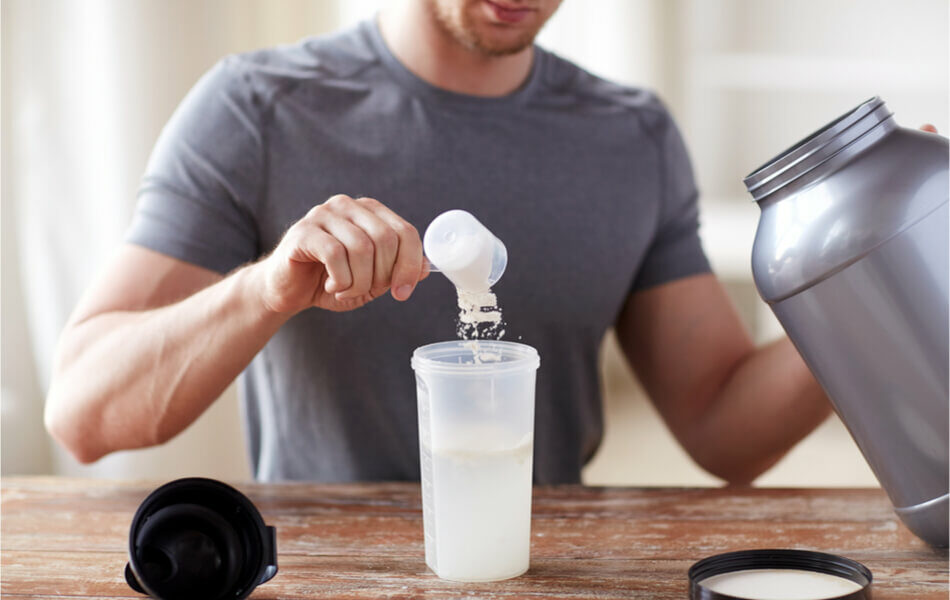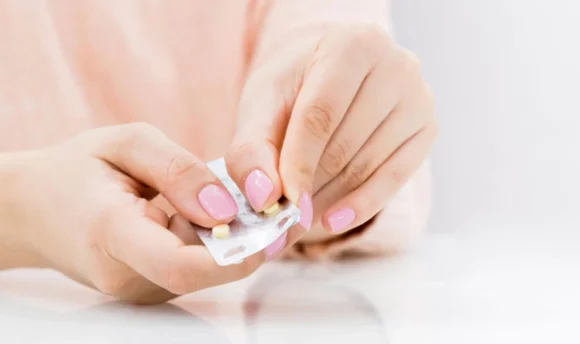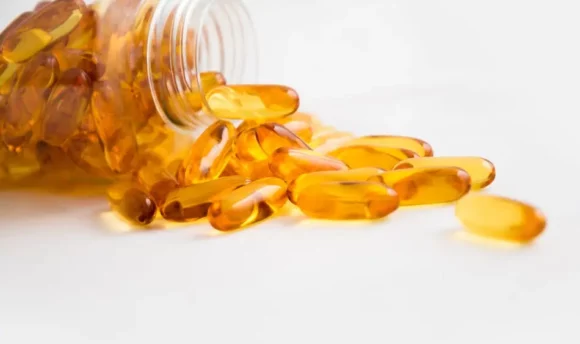Is Creatine Good for Weight Loss? Benefits and Drawbacks
Supplements are popular among people who want to feel healthy. Creatine is one of those products that aim to support your muscles. You might think – so does it also work for weight loss? We explain what creatine is and how it might help you lose some weight.

There are many supplements that can benefit your weight loss journey – creatine being one of them. Sometimes the human body needs an extra push to get through challenging workouts or diets.
Creatine may be a good choice if you wish to lose weight and achieve muscle growth. It has energy-boosting properties that will encourage you to reach your limits. Whether you’re at the gym or working out in the living room, creatine is great for enhancing performance.
Dietary supplements aren’t for everyone and they might not work for certain fitness goals. But if you want to feel stronger, natural compounds can support that body fat reduction.
So, does creatine actually help you lose weight?
In this article, you’ll discover what creatine is and if it’s good for weight loss.
Is Creatine Good For Weight Loss?
Creatine doesn’t have any fat-burning effects that can help you lose weight. It won’t directly burn fat or remove unwanted pounds from your body. However, pairing this supplement with cardio-based exercise will eliminate both soft and hard fat stores.
What Is Creatine?
Creatine is a natural substance that resides in your brain, heart, and muscle cells. It especially helps your muscles to produce energy during high-intensity weight lifting. Many people take creatine supplements to enhance their muscle performance.
About 95% of creatine inhabits each muscle in your body, and the other 5% focuses on your brain and heart. This amino acid is the key energy source for heavy weight lifting or strength training. Your muscles won’t be able to function properly if they didn’t have creatine.
Some people take creatine supplements to build lean muscle mass. Others might require a boost of energy to burn calories. It’s a completely organic substance that won’t harm the body or disrupt natural functions, so it’s worth taking if you want to feel stronger working out.
Creatine is also found in animal products like meat, fish, and poultry. You can get some of this amino acid just by eating beef steak or salmon with high-density meals. Raw herring filet has the most natural creatine since it contains 1.1g in just one 100g portion.
How Does Creatine Work?
Creatine increases the phosphocreatine in your muscles – a chemical compound that reserves energy for skeletal muscles. This natural substance fuels workouts that involve heavy lifting, cardio-based training, or simple strength challenges.
The body needs creatine to support your muscle protein synthesis. It enhances cell signaling in your brain that supports muscle recovery after intense training. If humans didn’t have creatine in their system, we wouldn’t be able to build strength or increase overall lean tissue mass.
You can take creatine supplements to expand water content in your muscles. This gives the appearance of bigger muscles after strength-based workouts. Creatine triggers a “cell volumization effect” that helps maintain muscle hypertrophy during weight lifting.
Creatine for Weight Loss – Does It Burn Fat?
No, creatine doesn’t directly burn fat on your body or reduce the overall fat percentage. Losing a few pounds requires cardio-based workouts that get the heart pumping. Creatine may increase your energy levels, leading to better exercise performance.
The only way to burn fat stores is through low-calorie diets and high-intensity exercise. Supplements aren’t meant to target fat stores or eliminate those unwanted pounds. It’s worth taking creatine if your goal is to build muscle and feel stronger doing strength training.
Creatine focuses on individual muscle growth by increasing protein in your skeletal tissues. This supplement won’t eliminate stubborn fat or prevent future weight gain. However, creatine might enhance your metabolism due to the muscles boosting your resting metabolic rate.
A stronger metabolism usually leads to a reduced fat mass. It can burn through calories quickly and stop extra glucose from forming in your body. Creatine monohydrate naturally gives you more energy throughout the day, which burns even more calories just through daily activity.
Any type of creatine supplementation won’t directly contribute to weight loss. Resistance exercise or high-intensity interval training (HIIT) is the best way of reducing your body composition. Creatine will only support your energy levels during those intense workouts.
You should take a creatine monohydrate supplement if you wish to build muscle while losing weight. This amino acid stimulates muscle protein synthesis – a metabolic process that helps proteins repair muscle damage caused by strength training.
The less delayed onset muscle soreness (DOMS) you experience, the more likely you’ll perform intense workouts. Creatine indirectly encourages the body to burn fat during cardiovascular exercise, as you have that increased energy to get the heart pumping fast.
Benefits of Creatine for Weight Loss
The effects of creatine may support many normal functions in your body. You can take a creatine supplement to enhance your performance when trying to lose weight. Just be aware that dietary substances work differently for everyone and will cause different results.
Let’s take a look at the three benefits of creatine for weight loss:
#1 Boost energy levels
Creatine supplementation helps your body to produce adenosine triphosphate (ATP) – a source of energy that supports muscle contraction, nerve impulses, chemical synthesis, and iron transport. This energy prolongs the time it takes for your muscles to get tired during workouts.
The more ATP you have in human skeletal muscle, the more likely you’ll perform high-intensity training. Burning those extra calories will encourage fat loss and increase lean mass. You should take creatine one or two hours before a workout to benefit from those energy boosts.
#2 Increase lean muscle mass
Taking oral creatine supplements can increase your muscle mass by alerting muscle growth hormones. Insulin-like growth factors (IGF-1) regulate anabolic and catabolic pathways in muscle cells. This causes your muscles to expand around any fat-free body mass.
Creatine may also retain muscle cell hydration. Many people experience heavier muscles due to the water being stored in those skeletal tissues. This physical change might be mistaken for weight gain, but creatine is actually key for maintaining structures of protein and glycogen.
#3 Ensure faster recovery
Creatine may increase recovery time in human skeletal muscle induced by weight lifting. A quick recovery might encourage you to perform more exercise throughout the month. More exercise leads to a weight loss of at least 1-2 pounds each week, depending on your diet and routine.
A faster recovery also means you can strip body fat in a short amount of time. Creatine supplementation binds with creatine phosphate – a molecule that gives your muscles energy to repair. Feeding your body the right nutrients can speed up your weight loss progress.
Possible Side Effects of Creatine
The creatine supplement may trigger side effects for certain people. You should always talk to a doctor before trying new exercise substances. Even though creatine is perfectly safe for consumption, it might not agree with sensitive stomachs or those with severe bloating.
Here are four common side effects of taking creatine:
Digestive issues: People who suffer from digestion problems might experience uncomfortable symptoms while on creatine supplementation. This might be due to the initial loading phase that dehydrates your body. Make sure to drink plenty of water while taking creatine on a weight loss diet.
Muscle cramps: Creatine may increase intracellular osmolality in muscles and cells. This is when fluid shifts from extracellular components. The reduction of this fluid might trigger muscle cramping. However, this is only temporary and should settle within a few days.
Bloating: All creatine supplements cause water retention that might increase bloating in those who have sensitive guts. This organic substance may show temporary puffiness around the face, arms, stomach, and legs. People often mistake this physical change for fat gain.
Water retention: Extra water weight is something you can’t avoid when taking dietary supplements like creatine. The supplement purposely draws water into the muscle groups for energy. This fluid retention should resolve itself a few weeks after the loading phase.
FAQs
No, creatine has zero calories, meaning it won’t disrupt weight loss progress. You can take this supplement on rest days without having to worry about counting calories. It might be worth adding creatine to high-density meals like green smoothies that have protein-rich ingredients.
Creatine is good for anyone who wants to boost their performance. It may benefit those who are overweight and need more energy to work out. However, be aware that water retention doesn’t mean you’ve gained weight. People sometimes mistake this for a hurdle in their weight loss.
Fluid retention might add puffiness to your face, arms, thighs, neck, and stomach. This is perfectly normal when taking creatine supplements. Water weight doesn’t mean you’ve gained pounds of fat. It only refers to the increased water stored in your muscles and cells.
A Word from Our Nutritionist
You should consume creatine if you want to build muscle and lose fat. This supplement doesn’t burn that fat directly, but it can strengthen your metabolic rate. A stronger metabolism burns more calories throughout the day, even when you’re breathing, sleeping, and sweating.
To lose weight on creatine, perform high-intensity workouts and go on a low-calorie diet to notice physical results. Resistance training is also great for building up your muscle strength. Creatine will drastically increase recovery time and help you achieve fitness goals.
You can always talk to a personal trainer or dietitian for exercise and nutrition advice. Getting expert opinions on losing weight may inspire you to try new workouts. Many trainers at the gym typically take creatine supplements to perform better and look extra lean.
If you have too many side effects from creatine, try alternative supplements. You can also increase your dietary intake of creatine-rich foods. These foods might be red meat and fish containing amino acids.
Conclusion
Creatine supplementation augments muscle growth through increased training intensity, but it won’t directly trigger fat loss. You’ll need to perform HIIT workouts or restrict calories to notice physical changes in body weight. Taking creatine alone can’t help you reach health and fitness goals.
It’s definitely worth having creatine if you want to lose fat and build muscle. This organic compound supports muscle building by feeding you more energy. Just take a single dose of creatine before or after meals to feel a difference in your strength and body composition.

















































 Select your language:
Select your language: 








